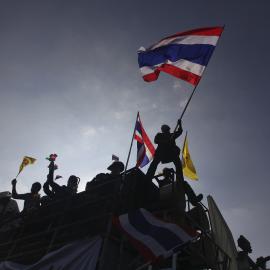To the Editor:
In his portrayal of Thai Prime Minister Thaksin Shinawatra ("The Battle for Thailand," July/August 2009), Bertil Lintner appears to have been influenced by the powerful and persistent propaganda in Bangkok.
Lintner is right that Thaksin's 2003 "war on drugs" ended up being controversial and that there were instances of police excesses. But drug trafficking was a major social problem that Thaksin inherited from earlier, more tolerant administrations. And to state that "in each province, the police (and in some cases, the army) followed quotas on the minimum number of drug dealers to kill" is to give voice to mere hallucination. There were no such quotas. On the other side of the war on drugs, during the Thaksin administration, drug addicts were treated for the first time as patients, not criminals. Several hundred thousand drug addicts underwent rehabilitation instead of serving jail terms.
Lintner also repeats lies propagated by the executive director of the Thai Journalists Association, who wrote that "Thaksin constantly interfered with Thailand's printed and broadcast media." This, too, is untrue, and no radio station, TV program, or Web site was shut down during the Thaksin years. In fact, Thailand saw a mushrooming of new publications and radio stations. It was only after Thaksin left office that 67 Web sites were closed down and a government spokesperson announced that the authorities would jam sites considered offensive.
In 2002, one year after Thaksin took office, and in 2006, just four months prior to the coup that
forced him out, the Asian Barometer research project conducted nationwide polls in Thailand. They found that the vast majority of Thais were satisfied with the way democracy worked in Thailand and with the Thaksin government. Between 2002 and 2006, the proportion of respondents who believed that government officials were corrupt actually declined.
"If Thailand is to become truly stable," Lintner concludes, "its democratic institutions will have
to be strengthened through more grass-roots participation in the decision-making process at all levels." By decentralizing decision-making within the administration and encouraging villagers to make their own choices, this is precisely what Thaksin tried to do.
PHONGTHEP THEPKANJANA
Former Minister of Justice of Thailand
